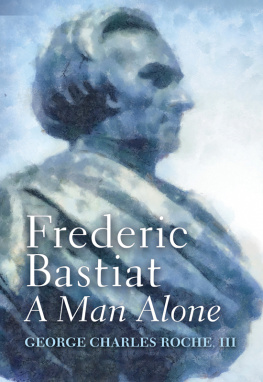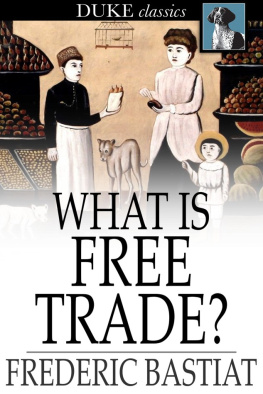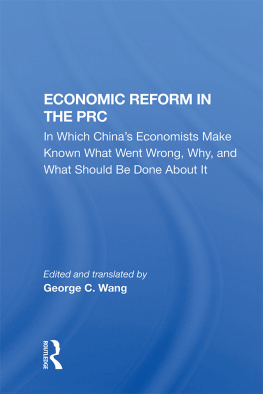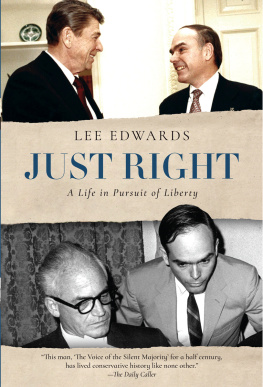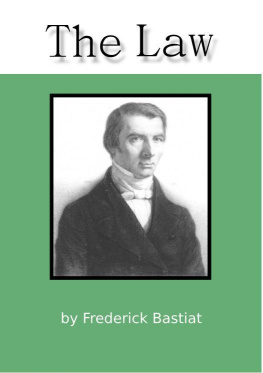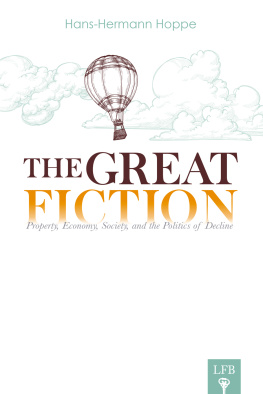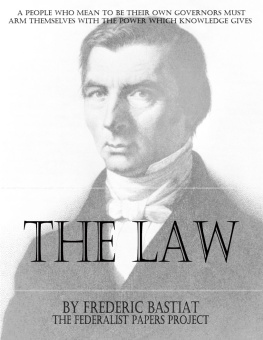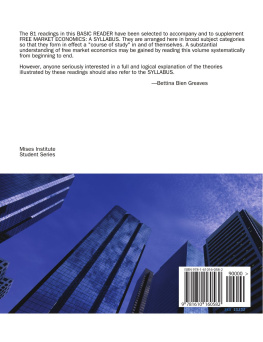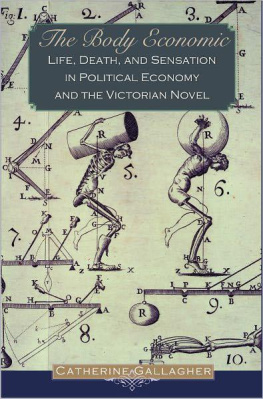FREDERIC BASTIAT
A Man Alone

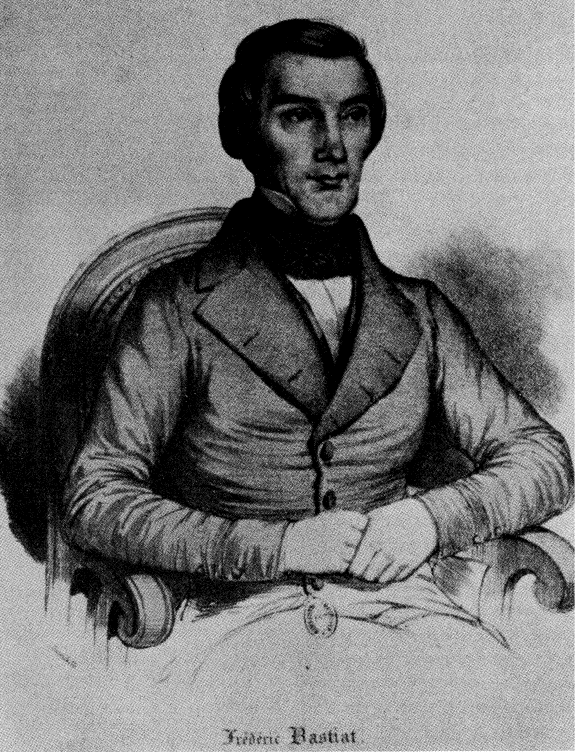
ARCHITECTS OF FREEDOM SERIES

FREDERIC BASTIAT
A Man Alone
GEORGE CHARLES ROCHE III

| ARLINGTON HOUSE | New Rochelle, N.Y. |

Copyright 1971 by Arlington House, New Rochelle, New York. All rights reserved. No portion of this book may be reproduced without written permission from the publisher, except by a reviewer who may quote brief passages in connection with a review.
Library of Congress Catalog Card Number 71-139891
ISBN 0-87000-116-7
MANUFACTURED IN THE UNITED STATES OF AMERICA
TO JUNE,
who knows so much more French than her husband.
Contents

Foreword
WHEN FOLLOWING THE IDEAS OF FREDERIC BASTIAT, THE reader often wishes to know a bit more about the man himself. This applies to many thinkers of consequencewe find their ideas so interesting that we think their lives must be equally exciting and significant. Bastiat, however, has remained a shadowy entity, even to his few biographers. The same scant details of the mans personal life appear in each of the several sketches devoted to his career.
In Bastiats case, it appears that there is little to tell concerning most of his personal life. Bastiat apparently spent his first 45 years in quiet preparation for the enormous flash of productive activity which occurred during his last five years.
Certainly the best study of Bastiats life is the most recentProfessor Dean Russells doctoral dissertationlater revised into book form, Frederic Bastiat: Ideas and Influence. Professor Russell emphasized the political significance of Bastiats thought rather more than previous studies had done, thus directing attention to a main thrust of the mans life. However, a fully rounded picture of Bastiat can be developed only if we view his age in historical perspective.
To see Bastiats significance clearly, it is necessary to study him as more than an economic journalist; more, even, than a political theorist. Bastiat must be analyzed against the historical background which molded his time: the Revolutions of 1789, 1830, and 1848, together with the forces generated by the Industrial Revolution and the response to those forces, especially in England and France. For in that upheaval and in Bastiats response to it, we find awaiting us an improved understanding of the middle-class political revolution which has dominated the Western world ever since. In Bastiats analysis of French politics, in his relation to the English Whig tradition, in the contrasting political and social thought as expressed by Bastiat and some of his contemporaries, notably Alexis de Tocqueville, we find new insights into the conservative-libertarian makeup that have a great deal of relevance for our own ideologically confused age.
Acknowledgement is due all those who previously have examined aspects of Bastiats life and thought, particularly Professor Russell. My editor and good friend at Arlington House, Llewellyn Rockwell, provided consistent encouragement from start to finish. The Foundation for Economic Education staff also did much to make this book possible. Mrs. Muriel Brown freely gave of both her secretarial assistance and her unbounded enthusiasm. Edmund Opitz provided several very helpful lines of thought which greatly improved my own understanding of Bastiat, while Paul Poirot generously provided his customary patience, insight, and good sense during all phases of the manuscripts preparation. Special thanks also go to Leonard Read, who years ago rescued Bastiat from the historical ash-heap and who was among the first to realize the enormous importance of Frederic Bastiat.

Introduction
FOR THE PAST TWO CENTURIES, THE WESTERN WORLD HAS been torn by a continuing debate: Does the well-being of society as a whole stem from the freedom of enlightened individuals to pursue their own interests; or must government intervene in the lives of its citizens to assure the greatest collective good? Oddly enough, the liberal historically has taken first one side and then the other in that debate. Liberal today implies a readiness to use government as a problem-solving device, as a handy and absolutely necessary tool to save the citizens of the republic from the dangerous effects of excessive freedom. In the first half of the nineteenth century, during the lifetime of Frederic Bastiat, liberal had a precisely opposite meaning. For Bastiat and the liberals of his age, the encroachment of the state in the lives of its citizens was not a solution to societys problems, but instead was the problem itself.
Though the meaning of the word liberal has changed greatly since Bastiats day, the underlying argument has not. We are still trying to decide whether or not government should be the final arbiter of mens lives. This is why Bastiats words have so much relevance today. He addresses himself to the central argument of our own times. And he does so in a fashion as down-to-earth as our daily lives. Always quick to defend the consumer, the forgotten little men of most modern economic analyses, Bastiat writes in terms at once understandable and entertaining. He often turns a withering blast of ridicule on those who presume to know whats best for everyone else. And, of course, to be laughed at is the one thing which big government has never been able to stand.
Writing long before government reached the enormous proportions of our own times, Bastiat predicted the history of the past century:
The state quickly understands the use it can make of the role the public entrusts to it. It will be the arbiter, the master of all destinies. It will take a great deal; hence, a great deal will remain for itself. It will multiply the number of its agents; it will enlarge the scope of its prerogatives; it will end by acquiring overwhelming proportions.
Few of todays readers will even recognize the name of Frederic Bastiat. Yet he was one of those men fated to stand at the crossroads of sweeping historical events and radically conflicting ideologies. He lived his life in the turbulent aftermath of the French Revolution and personally witnessed the upheavals of 1830 and 1848. He was active in the political and ideological debates of his age. The battles he fought as a mid-nineteenth-century public figure were the battles which still mold the events and the thinking of the Western world. This perhaps explains the timely and lively quality of Bastiats thinking which immediately strikes the reader of today.
As an author, columnist, and politician during a stormy period of French history which brought the citizens to the barricades again and again and which witnessed the overthrow of several French governments, Bastiat realized that the radical changes induced by the Industrial Revolution were making a totally new society of Europe. There could be no road back to the past, no staying the hand of change. He saw before most of his contemporaries that Western men had their destinies in their own hands as never before. Prosperity or disaster awaited the new industrial world, depending upon a single issue: would men allow the system to work, or would they, in Bastiats phrase, fear liberty too much to give themselves this new beginning? Bastiat realized that the very complexity of the new order demanded a flexibility that the dead hand of government planning could not tolerate, a flexibility which only individual freedom in transactions could supply. The slender Frenchman spent his life fighting to give all Frenchmen the freedom which alone could make the specialized world of the Industrial Revolution function properly.
Next page
